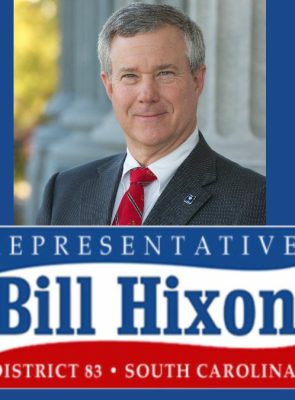Dear Friends,
I hope everyone had a Happy and Blessed Easter!
It was my pleasure to meet the third grade class from Mossy Creek Elementary. They had a tour of the State House during Session and they now have a hands-on understanding about how our state government operates.
Congratulations to NAHS Improvement Council!: On March 23, the North Augusta High School Improvement Council received the Honorable Mention award for the S.C. School Improvement Councils. The Council's efforts to implement the Freshman Academy and mentoring programs, among others, were noted. The Council was one of 9 finalists for the annual award for top council in the state this year.
Hammond Hill Elementary School Visit: Last Wednesday, Senator Tom Young and I visited Hammond Hill Elementary School in North Augusta. The school has received two awards for excellence this year: (1) National Blue Ribbon and (2) Palmetto's Finest.
In order for me to have a strong voice in Columbia, I have to communicate with my constituents. And that is you! My website, newsletters, mailers and Facebook are the communication tools that I use. It takes extra time, staff and campaign funds to maintain them.
If you would like to contribute, please mail a check to Hixon for House, P.O. Box 7927, North Augusta, SC 29861, or contibute online by going HERE.
LEGISLATIVE UPDATE – April 4, 2013
The last few weeks have been busy in the House. We are on break at this time but will return on Tuesday, April 9, 2013. Here are some of the issues we have been addressing:
Balancing the Budget:
By approving H.3710, the General Appropriations Act and H.3711, the joint resolution making appropriations from the Capital Reserve Fund, the House of Representatives sent to teh Senate its Fiscal Year 2013-2014 State Government Budget totaling $22.7 billion, which includes $6.3 billion in recurring state general funds and $113 million in capital reserve funds.
The budget legislation fully funds the state's reserve accounts that are used to cope with revenue shortfalls. The growth in appriations under the proposed budget falls within the spending limitations criteria that the House has approved in several bills in recent years.
SC Roads:
The budget accommodates the redirection of motor vehicle sales tax revenue to fund highway, road and bridge maintenance, construction, and repairs which the House recently approved by sending to the Senate H.3412. Phased in over the course of two years, this redirection credits tax revenue collected on the sales of motor vehicles, except for revenues supporting the Education Improvement Act, to the STate Non-Federal Aid Highway Fund so that the total, representing $82.8 million, will ultimately serve as a dedicated funding source for the state's infrastructure needs. The budget legislation also devotes $60 million in unobligated general fund revenue generated during the current fiscal year to bridge rehabilitation and replacement. For Fiscal Year 2013-2014, the budget legislation transfers to the Non-Federal Aid Highway Fund certain fuel tax monies from the Department of Natural Resources and the Department of Agriculture and these agencies are provided general fund appropriations to supplant this loss of revenue.
DOR Breach:
As a result of the Department of Revenue computer security breach of 2012, $25 million from the Capital Reserve Fund is included to provide at least one additional year of consumer protection services for citizens whose personal financial information was compromised. Any remaining funds are to be used for state cyber security inprovements. The budget legislation repays the $20 million dollar loan from the Insurance Reserve Fund for costs associated with the data breach and fully funds DOR's $7.5 milion request for a new information technology system.
Medicaid:
The budget legislation does not include an expansion in eligibility for the state's Medicaid Program as allowed by the federal "Patient Protection and Affordable Care Act" of 2010. Instead, the proposed budget includes a redirection of Medicaid spending under a new comprehensive Medicaid Accountability and Quality Improvement Initiative to be undertaken by teh state Department of Health and Human Services upon approval by the Centers for Medicare and Medicaid Services (CMS). A total of up to $35 million ($10.5 million in state funding) is devoted to the Healthy Outcomes Initiative which would provide financial incentives for hospitals to reduce reliance on comparatively expensive emergency room treatment. This initiative involves participating in price and quality transparency efforts and entering into agreements with primary care providers to help meet the needs of chronically ill uninsured patients through home visits and care in other settings outside the emergency room. The uncompensated care costs at designated rural hospitals would be provided at 100% of the cost, $20 million, ($6 million in state funding). New Disproportionate Share Hospital (DSH) payment accountability provisions are included for uncompensated care payment claims-level data improvements. $10 million is devoted to a primary care safety net program for the treatment of low-income, uninsured patients that involves Federally Qualified Health Centers, rural health clinics, free clinics and Welvista. $8 million is provided to enhance a telemedicine program at the Medical University of South Carolina. $1.6 million is devoted to an inititative to enhance rural provider capacity by leveraging the state's Graduate Medical Education program, Supplemental Teaching payments, and teaching hospitals to encourage physicians to work in underserved areas, expanding the use of telemedicine to allow rural areas to make advantage of medical expertise from elsewhere in the state, and providing for targeted placement and support of OB/GYN services in at least four counties with demonstrated needs. $7 million is provided for the Optional State Supplement that assists elderly, blind, or disabled individuals in paying for communit residential care facilities.
Education:
The proposed budget devotes around $175 million new dollars to K-12 education for the 2013-2014 fiscal year. $77 million in new funding is directed to the Education Finance Act, with $20.5 million used to maintain the current base student cost of $2,012 in the face of enrollment growth and an additional $56.4 million used to increase the base student cost to $2,100 for each student. Funds provided should be sufficient for school districts to award their teachers a salary step increase. This would be left up to each county.
The budget legislation supsends state-funded teacher salary supplements for National Board Certification for new applicants during the coming fiscal year and requires a study on the effectiveness of the state's National Board Certification incentive program.
Around $13 million dollars is devoted to school transportation for the maintenance and up keep of the state's school bus fleet. $10.5 million from the Capital Reserve Fund is included for the purchase or lease of new school buses. New buses cost about $75,000 each.
School districts are directed to make funding flexibility provisions to ensure that district-approved safety precautions are in place at every school.
State Charter School funding is increased by $12.1 million.
Over $36 million is set aside in a contingency fund to replace the possible loss of federal Individuals with Disabilities Education Act (IDEA) funds. Should the state succeed in its lawsuit regarding its funding of education for students with disabilities, the contingency fund will, instead, be distributed to the school districts using the Education Finance Act funding formula.
Full funding is provided for the LIFE, HOPE, and Palmetto Fellows higher education scholarship programs. The National Guard Tuition Repayment Program is provided an additional $2.85 million to address recent shortfalls.
The state's colleges and universities receive nearly $12 million in General Fund increases and $10 million in one-time funding. I am thanked each week by some of the recipiants of these scholarships. As an example, I saw a mother and daughter in Lowe's Saturday, and the daughter hugged me and thanked me for making sure she continued getting scholarships. She said that without these scholarships she could not go to college. It makes me proud to be a House Member when I see the results of these scholarship programs.
Worker training through the Ready SC Program at the state's technical colleges will have $7.5 million devoted to it. $5.5 million is included for System-wide Infrastructure and Workforce Development at the State Board for Technical and Comprehensive Education. The Board's Manufacturing Skills Standards Council Initiative is provided $2.5 million. These programs help us bring new companies to our state to create new jobs.
New Job Growth:
The Deal Closing Fund that the Department of Commerce uses to recruit new business to the state is provided $13.3 million. $1 million in capital reserve funds is included for the Department's Business Incubator Program.
In response to a recent initiative for regionalizing services at the Department of Employment and Workforce (DEW) which closed several unemployment offices in rural areas, DEW is directed to use up to $1.5 million of its funding to provide all counties affected by the recent closures with functioning Unemployment Insurance centers to assist with both unemployment claims and reemployment training. The Edgefield County office was set to close but that closure has now been stopped. DEW is afforded funding flexibility for the purpose of maintaining Unemployment Insurance centers in each county.
The Department of Parks, Recreation and Tourism is provided with $3 million for tourism sales and marketing and $4 million for the destination-specific tourism advertising program.
Law Enforcement:
Total funding for the State Law Enforcement Division (SLED) is increased by $4.4 million. $1.8 million of the nonrecurring revenue is directed to provide for vehicle replacement at the SLED, the Department of Public Safety, and the Department of Natural Resources. $1 million is provided for 25 new parole agents. $8.5 million is provided for the restoration of the general fund base of the Department of Juvenile Justice, addressing budget cuts sustained by the agency during the recent years of recession. We need this to keep our citizens of this state safe.
Other:
The budget also allots:
- $4.2 million for agency operations at the Department of Health and Environmental Control
- $2 million from the Capital Reserve Fund is included for Forestry Commission firefighting equipment and funding is provided for 12 new firefighters
- $5 million is provided to the Election Commission for a new statewide voting system
- The Arts Commission continues to be funded at current state dollar levels
- The funding rationale continues that eliminates all general funds for South Carolina Education Television, but allows SCETV to retain revenue derived from contracts for the use of its broadcast towers, signal spectrum and other facilities and services in order to fund its operations.
- The Lt. Governor's Office of Aging is afforded $4.2 million for home and community based services and caregivers.
Restructuring:
The House approved legislation that would allow the state Adjutant General to be appointed by the Governor. The legislation – actually a state constitutional amendment – gives voters of our state the right to decide this in the November 2014 election.
Currently, we are the only state in the country that elects our Adjuntant General, and the current holder of the office, General Bob Livingston, has been very outspoken in his support of the amendment. It is important to have someone with experience leading our National Guard, which is not guaranteed if it remains an elected position. This bill now goes before the Senate.
"Sweepstakes":
The House also approved legislation that bans the "Sweepstakes" machines that some businesses are installing across our state by exploiting a loophole in the law. This comes a dozen years after the state Supreme Court banned video poker.
FOIA:
The House sent legislation to reform our state's Freedom of Information Act (FOIA) back to a committee to strengthen the bill. We support reforming the FOIA to make government information more accessible to the taxpayers who fund the government.
An amendment was added to the bill late in the process that would eliminate the "legislative exemption". We support reforming the exemption; however, in the weeks since the amendment was introduced, a number of issues have arisen. Constituents frequently write legislators about issues with the Department of Social Services or the Department of Revenue that have private and confidential information in them. Also, the House does not currently have the full-time staff or technology available to effectively comply with a new Freedom of Information Act while preserving the privacy of our constituents. we do not want to accidentally create an issue that would require the state to spend millions of dollars to comply.
Also, constituents contact legislators on private email addresses, Facebook, Twitter, and other social media outlets. Archiving that information is not easy. I am sure yo do not want the world to know what you sent me in a personal email.
We can solve these issues easily, and the committee is the best place to do so, not the House floor. We will fight to get this back out of committee and to the House floor again as soon as possible. You have to be careful when you pass a bill. Sometimes you catch more than you intended.





